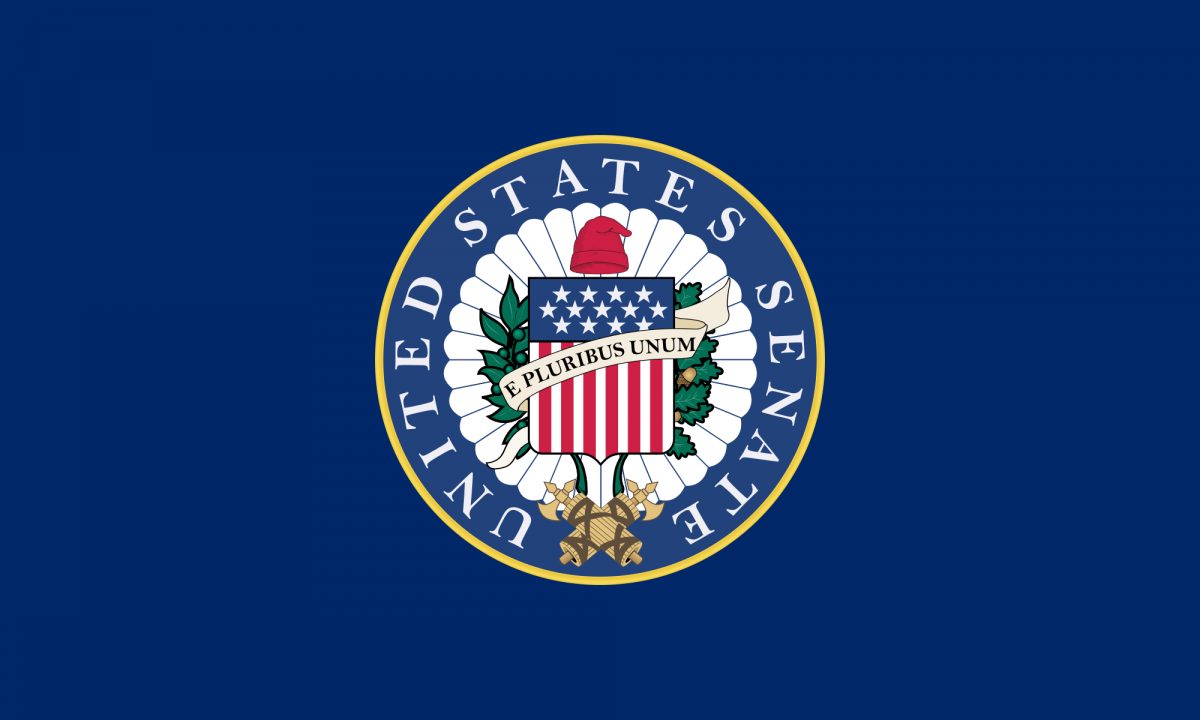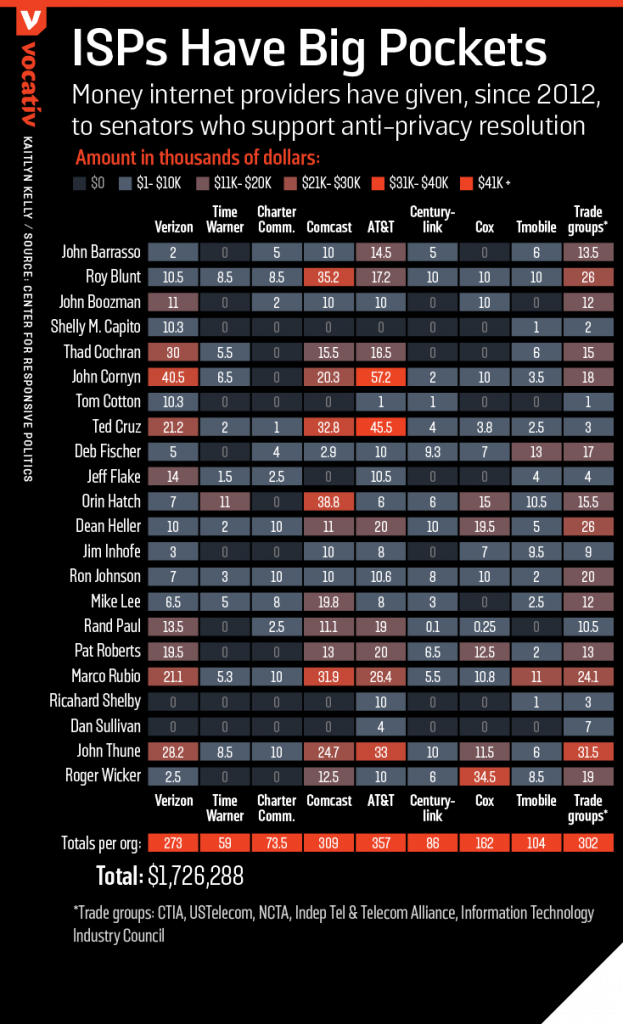Today, Senators will vote to allow ISPs to sell your internet history and end FCC online privacy rules

On March 23rd, 2017, the US Senate votes on S.J.Res 34, which would use the Congressional Review Act to strip away online privacy protections gained under the FCC and also disallow the FCC from enacting privacy rules in the future. The resolution, if passed along with its House counterpart and then signed into law, would pass the responsibility of online privacy regulation from the FCC onto the FTC, with the American public losing out in the meantime.
The FCC online privacy rules currently require ISPs to get your affirmative consent before selling your personal, sensitive information to advertisers. Notably, the FCC didn’t go as far as to ban “pay-for-privacy” schemes that were being offered by some ISPs. Back in 2016, when the FCC passed sweeping net neutrality and online privacy rules for Internet Service Providers (ISPs) and telecoms to follow, the FTC did release a statement titled: Net Neutrality and Privacy: Don’t Fear the Reclassification.
The Senators that proposed this resolution did so for a reason
If you’re wondering whether or not the Senators that proposed S.J.Res 34 received any money from ISPs or telecoms, the answer is a resounding yes. Vocativ has a nice infographic that shows which Senators have received donations from telecoms and ISPs, and even trade groups like the CTIA. In a recent filing with the FCC, the CTIA has been attempting to push the idea that web browsing history and app usage data are not sensitive information.

Some do still believe in online privacy
The opposition to this Senate Resolution comes from far and wide, as it should. The internet history of every American is what is at stake, and there are advertising agencies around the world waiting to scoop up your private information. ACLU Counsel Neema Singh Guliani warned:
“With this move, Congress is essentially allowing companies like Comcast, AT&T, and Verizon to sell consumers’ private information to the highest bidder”
Senator Brian Schatz called it:
“The single biggest step backwards in online privacy in many years.”
Senator Edward Markey commented:
“Just as phone companies cannot sell information about Americans’ phone calls, an internet service provider should not be allowed to sell sensitive consumer information without affirmative consent.”
He also tweeted:
🚨 ALERT: @SenateGOP will vote tomorrow night to allow ISPs to sell your personal info to the highest bidder. Protect #BroadbandPrivacy 🚨
— Ed Markey (@SenMarkey) March 22, 2017
What can you do to protect your online privacy?
Even if S.J.Res 34 makes it through the Senate, Americans still have one last chance in the House of Representatives to make a stand. The exact date for the vote for the House counterpart to S.J.Res 34, H.J.Res 86, still isn’t set yet; however, it is slated to be in the next month.
Join Fight for the Future (FFTF) at their new website Save Broadband Privacy to sign a petition to tell members of Congress to save #BroadbandPrivacy. FFTF concisely described why you should care if these laws are passed and FCC online privacy rules are revoked and never allowed to come back again:
This isn’t just your browsing history or cookies. It’s geolocation data, financial info, passwords, health info, even your Social Security Number. Anything you do, any data you enter, any online video you watch, any email you write. Your ISP could store it all and sell it for their own profit if Congress throws out the FCC rulings.
Like this article? Get notified by email when there is a new article or signup to receive the latest news in the fight for Privacy via the Online Privacy News RSS Feed.
Comments are closed.

Thank God I live in Canada, the republicans have completely sold out and lost their way.
Actually both parties have. They’re the same. Dems wouldn’t do it any different.
Except that they LITERALLY DID. That’s how we *got* the rules they just voted to overturn — they were put in place by the FCC under a Democratic president.
Let’s stop with the fake equivalency bullsh*t. It’s one thing to highlight that both parties have downsides, but it’s another entirely to ignore such an outright, obvious difference on policy.
its all because they believe regulation destroys capitalism…as if these conglomerate corporations need another boost while exploiting every tax loophole imaginable and not-yet-imaginable.
Regulation does hurt GDP and growth. But some regulations like this one are good.
If you like this news, check out more like it at http://www.worldwidedailynews.com
How shocking. The GOP are, yet again, trying their best to systematically destroy protections for the American people for the benefit of private enterprise.
I spoke with both Ted Cruz and Ken Cuccinelli in 2014. On the topic of Net Neutrality, they both drolled the same talking points about “government control” and “free market” nonsense. Most amusing was that they both ended their stumps with “If you don’t like it, start your own ISP.”
“I can’t — nobody can — because people like yourself have allowed the biggest telecoms to hold monopolies on the cable and fiber-optic infrastructure in this country since Reagan was president. There is no “free-market” because nobody can enter the market and compete!”
Both times, the sockpuppets and their groupies fell silent and just walked away. Funny that, eh?
Actually, if you live near a free internet exchange point, starting your own ISP could be fairly easy and not too expensive. However, I hopefully think we will start to see ISPs come out that are about privacy. I for one have been thinking of starting my own in my area because of the fact that most ISPs are so bad
Respectfully, I’m not convinced that you know what you’re talking about. Even with accepting what you’ve said, you wouldn’t be able to provide affordable service without renting bandwidth from one of the “Big Four” that already owns the cable in that geography. And, no, you can’t lay new cable because they own exclusivity in that area!
I previously lived in a community where Comcast held an exclusive contract to service our town. While towns North and South of us were enjoying Verizon’s Fios, our City Counsel had made the decision that Comcast’s DSL — at prices twice higher than Verizon — were good enough for us!
This is an industry worth $50+ billion dollars! If there’s anything in their behavior with government or the public that suggests to you that they have any inclination of sharing access to this industry outside of a monthly subscription, then clearly you’re not paying attention!
You’re right, I don’t know what I’m talkin about. But I do know some things. It is impossible for me to know everything. That’s why you have team members and partners.
I’m not going to let a lack of knowledge stop me from trying to make things better for people. This is something that I am passionate about and I want to see it happen. I may not be some huge company, but maybe I will end up doing something small in my local community.
Both parties are corrupt
The fact that the GOP claims it most resembles American values while simultaneously supporting private property violations is disgustingly hypocritical
Except that the legalism of their round-about argument is that your browsing history — your activity over an ISP’s private network — isn’t your private property, but rather data that belongs to the ISP. The next step after this is that banks will lobby to buy and sell private financial records, arguing that because those records exist on their computers, it’s their data to sell.
How to defeat these measures is at the State level, where State legislators can regulate ISP’s operating within their boarders and prohbit them from selling, trading, or transferring user data in ways that would compromise the privacy of their State’s residents. It’s simple, but it takes some work!
Thats like saying its technically Target owns your car since you use Targets parking lot.
Not quite the same. It’s like target selling a list of products you buy to marketing firms.
thats because the GOP is no longer the party of the people and is instead the party of the greedy old bastards
thanks Angry!